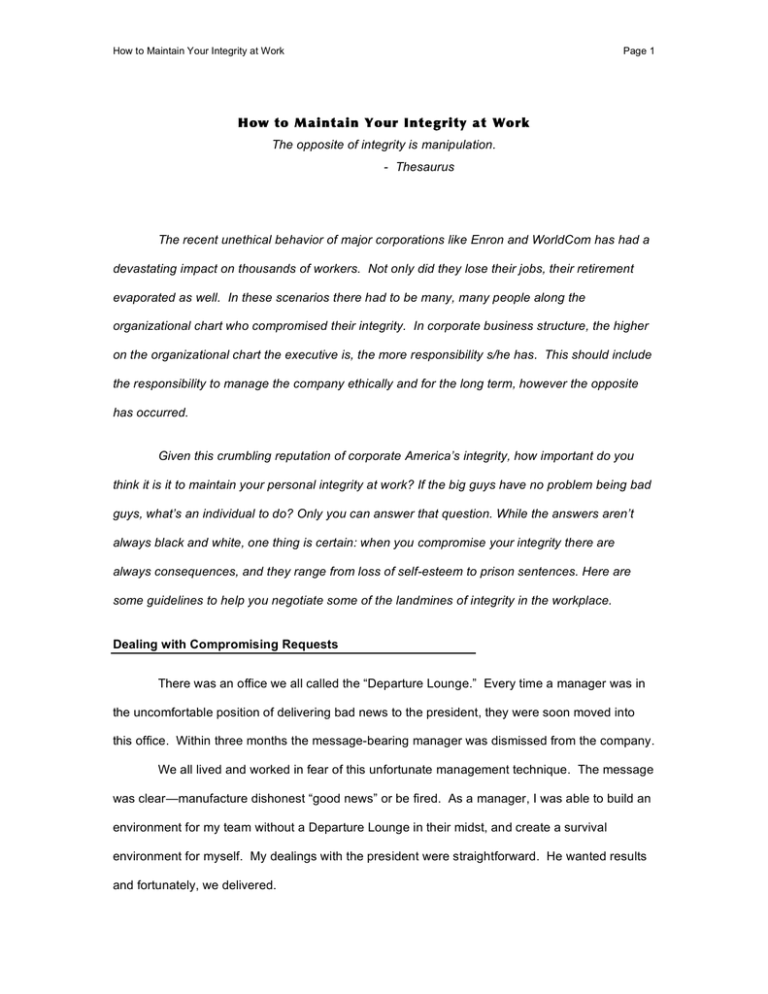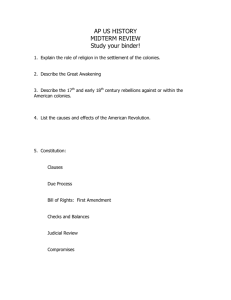
How to Maintain Your Integrity at Work
Page 1
How to M a in t a in Your In t e gri ty a t Work
The opposite of integrity is manipulation.
- Thesaurus
The recent unethical behavior of major corporations like Enron and WorldCom has had a
devastating impact on thousands of workers. Not only did they lose their jobs, their retirement
evaporated as well. In these scenarios there had to be many, many people along the
organizational chart who compromised their integrity. In corporate business structure, the higher
on the organizational chart the executive is, the more responsibility s/he has. This should include
the responsibility to manage the company ethically and for the long term, however the opposite
has occurred.
Given this crumbling reputation of corporate America’s integrity, how important do you
think it is it to maintain your personal integrity at work? If the big guys have no problem being bad
guys, what’s an individual to do? Only you can answer that question. While the answers aren’t
always black and white, one thing is certain: when you compromise your integrity there are
always consequences, and they range from loss of self-esteem to prison sentences. Here are
some guidelines to help you negotiate some of the landmines of integrity in the workplace.
Dealing with Compromising Requests
There was an office we all called the “Departure Lounge.” Every time a manager was in
the uncomfortable position of delivering bad news to the president, they were soon moved into
this office. Within three months the message-bearing manager was dismissed from the company.
We all lived and worked in fear of this unfortunate management technique. The message
was clear—manufacture dishonest “good news” or be fired. As a manager, I was able to build an
environment for my team without a Departure Lounge in their midst, and create a survival
environment for myself. My dealings with the president were straightforward. He wanted results
and fortunately, we delivered.
Copyright by P. Pixton, August 2005. All rights reserved. All trademarks respected.
How to Maintain Your Integrity at Work
Page 2
I successfully managed to work with my team within the environment I had created for us
for several years, eventually becoming the vice president. Then one day a development manager
came to me with very bad news about the biggest, potentially most profitable project our company
had ever landed.
“You have to tell the president we aren’t ready,” Andrew said. “There’s something wrong
with my system and I need time to figure it out.”
Why me? We stared at each other in silence and thought of the departure lounge. This
was bad news. Andrew explained that delivery on our project would be late, but we couldn’t even
say how late until we finished the analysis.
I figured if we went in together and asked for more time as a group no one person would
be singled out to lose his or her job. We held meetings for a week with managers, planners,
advisors, and technical experts so our information would be honest and accurate. In the end we
presented the option of a three-month delay with a detailed plan about how it would be
realistically achieved. The president was furious.
“I’ll show you how to finish this by the original deadline,” was all he said.
We were flabbergasted. We all knew it was impossible. Andrew caved in under the
pressure and agreed with the president that the project could be done on time. I quietly stated
that we could not complete the work in less than three months time. The meeting adjourned, and
after that time I was out of the loop as far as planning or status meetings.
As I wandered the halls during an especially important meeting when the delivery date
was to be decided, I passed the office of one of the board members.
“Why aren’t you in the meeting?” he asked.
I walked slowly to the seat in front of him and sat down. He wanted to know what was
going on and asked probing questions. The president was planning to tell everyone we would
deliver on time and I knew this was not true. Could I lie? Could I tell this board member what the
president wanted him to hear? This was an expensive project. In order to cover the costs, the
board was hoping to sell our new system to other countries. If it didn’t work when we went live,
no one would want it, and selling the system might not be an option. What about the ‘Departure
Copyright by P. Pixton, August 2005. All rights reserved. All trademarks respected.
How to Maintain Your Integrity at Work
Page 3
Lounge’? If I told the truth, how long would I have a job? I told the board member what had
happened, hoping he might be able to help. He said he would talk to the rest of the board.
I hoped they would agree to the necessary delay, and we could begin to correct the work
in a realistic time frame, even if slightly late.
Two weeks later I left on vacation. Soon after, the planning manager resigned, the
following day the other development manager resigned. Two days later a new organizational
chart was presented to the company. I called after the presentation and talked with the business
manager.
“Am I still on the organizational chart?” I asked, as a joke.
Silence. “Didn’t someone call you?”
There was no departure lounge for me. I was allowed to resign, effective immediately.
When I returned home I found the things from my office stacked inside the door of my apartment.
After a few years, I returned for a visit. The President and Andrew were gone. They had
finally delivered the product, but late. Three months after the system went live, operations were
suspended to correct a major design flaw in Andrew’s system. My predictions had been true but I
was not able to change their direction.
I discussed what to do with this ‘asked to resign’ issue with my mentor a year later.
“But you did resign. When you decided to tell the truth, you knew you would lose your
job,” he said. “I would have done the same.”
Assessment First
So, it happens. What can you do when you are asked to lie at work or to compromise
your integrity?
Once you are in this position, you’re in the territory of risking your job and possibly your
reputation. The first step is to take some time and assess your situation. When the request is
made, buy some time by saying, “I’ll get back to you on that.” Make your assessment, consider
Copyright by P. Pixton, August 2005. All rights reserved. All trademarks respected.
How to Maintain Your Integrity at Work
Page 4
the possible outcomes and choose the one for you based on how much you are willing to risk.
Consider the following:
•
What kind of person has made this request?
•
How much influence do they have?
•
Why have they made this request?
•
Why have they asked you?
•
What are the possible outcomes?
•
How much are you willing to risk?
•
Can you talk about this with anyone in confidence?
Responding to Compromising Requests
You do have multiple options and alternative responses in dealing with the request. The
options below are listed in order of risk. The first response will have the least risk, so try it first.
1) Present an Alternative
Find another solution that doesn’t compromise your integrity yet achieves the same goal.
There are three possibilities: Less cost or time, same cost or time, or increased cost or time. If
your alternative will cost less, your alternative will usually be accepted. If your alternative takes
longer or costs more, present it anyway and give it the hard sell. It could give you time to find
another, more cost-effective alternative and it might prod the requestor into re-thinking the
purpose of the activity.
There may be some resistance because the alternative wasn’t the requestor’s idea.
Tread lightly and see if you can ‘plant the seed’ for the alternative in their mind. Don’t be
surprised if they come back later with a ‘new’ (your) activity, hoping you hadn’t started on the
original task. Remember that people are rarely fired for alternative suggestions; humiliated
maybe, but rarely fired.
Copyright by P. Pixton, August 2005. All rights reserved. All trademarks respected.
How to Maintain Your Integrity at Work
Page 5
2) Question the Purpose and its Possible Consequences
Ask for an explanation about how this activity is aligned to the purpose of the
organization. Be sure to make it a question. To say, “this doesn’t fit with our purpose here,” will
put you into a war-of-the-wills with your boss and you will be in a power struggle you will most
likely lose.
Match your directness with the receptivity and position of the person making the request.
Hopefully, your question will “plant the seed” that this questionable action need not be done, or
may have unintended detrimental consequences.
3) Express Reservations
Express your concern with doing the task at hand. You can ‘own’ your concern by
making it personal. Try saying, “I’m uncomfortable doing this. Is there another way to
accomplish the same thing?” Be sure you do not embarrass or humiliate the person making the
request when you state your concerns.
4) Tell Someone
If you talk to someone about this request with the intention that they do something to
intervene, you will put your position at high risk. This depends on the influence the requestor has
in the company. Carefully assess their power and decide how much you are willing to risk.
You might not have to talk to anyone. In one case, an unknown person ‘accidentally’ left
critical information in the copy machine. The task was deferred and the requestor was fired.
5) Refuse the Task
As a last resort you may have to state this is something you simply cannot do. You have
to be prepared for the consequences here -- the loss of your job or your position in the
organization. There are ways to decline gracefully. Just be sure you do not humiliate the person
making the request, or get into a conflict of wills or power struggle.
State why you can’t do this activity. How you do this and how much of your reasoning
you reveal depends on how well you know the requestor, how much influence he or she has on
Copyright by P. Pixton, August 2005. All rights reserved. All trademarks respected.
How to Maintain Your Integrity at Work
Page 6
your work status, and how much you are willing to risk. Make it clear that you understand and will
accept the possible consequences of your refusal.
Protect yourself. Stating that you will not do this task because it would compromise your
own integrity to a controlling person would appear as an insult. (However, to a person with some
integrity, this would strike a chord of understanding.) So, do you care whether or not you insult
this person by raising the issue of integrity?
You Said You Would, Now What?
Is not doing the task after you have agreed to complete it a breach of integrity? You have
given your word, and now you’re in a bind. To not complete the task would be dishonest, but to
do the task will compromise your integrity. You are in a ‘no-win’ position. Begin to correct this
situation as soon as possible using one of the responses listed.
Avoid these situations whenever possible. They damage your reputation, and make it
difficult for people to trust you.
Too Much to Risk
What if you feel you can’t pursue any of these responses because you cannot risk losing
your job? Each time you compromise your integrity you will betray yourself, eroding your selfrespect, and with it, your self-confidence and self-esteem. You will become fearful, frightened,
uncertain, and unhappy. Compromising your integrity is the start of a free-fall that is difficult to
stop. You may gain power, status, and control, but at the cost of your self-respect and peace of
mind.
You can avoid too much damage to yourself by looking for another position immediately.
The compromises become a temporary situation. Remind yourself every day, “I am just doing
this until I find a job that won’t ask such things of me.” However, this only works when you are
actively searching for a new position.
Copyright by P. Pixton, August 2005. All rights reserved. All trademarks respected.
How to Maintain Your Integrity at Work
Page 7
Situational Integrity?
Are there times at work where compromising your integrity is justifiable? Are there any
situations when it is possible to act without integrity for the good of the company, to make the
sale, or reach the corporate goals?
A director of sales had to reach his quarterly goal of $2 million in delivered product or two
people in the organization would lose their jobs. At the end of the quarter, they were $50,000
short. The product had technically been sold, but manufacturing could not deliver the product by
the sales reporting deadline. The director told manufacturing to ship empty boxes to these
customers and then immediately call them to apologize for the error, stating the product would
arrive on a specific date—guaranteed. The sales were recorded earlier than they otherwise would
have been.
Is this compromise acceptable? She did save two jobs.
In Conclusion
We all sell our ideas, expertise, and hard work to the companies or clients we work for.
And each of us must decide whether our integrity is also owned by the company. I have come to
understand that our integrity is the lasting quality in all the work that we do. It establishes our
reputation and promotes the credibility of our efforts.
However, there is even a larger effect when we compromise our personal integrity. Our
self-esteem erodes and work begins to be a difficult place to be. Can you quit? Maybe not,
maybe not right away. The price tag of compromise comes very high.
For the work we do, integrity can be a guide. It clearly defines the boundary between
profit and greed.
###
Copyright by P. Pixton, August 2005. All rights reserved. All trademarks respected.


